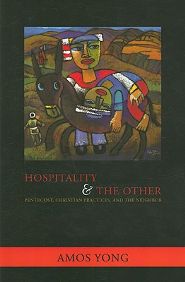Amos Yong: Hospitality and the Other

Amos Yong, Hospitality & the Other: Pentecost, Christian Practices, and the Neighbor, Faith Meets Faith Series (Maryknoll, NY: Orbis Books, 2008), xvii + 169, ISBN 9781570757723.
The theology and literature of hospitality is a hot topic. Over the last decade a plethora of theses, dissertations, monographs, books, and articles, whether scholarly or popular, sacred or secular, have filled our bookstores. In light of these innumerable publications, one might wonder why another work on “hospitality,” “neighbors,” and “strangers.” But would-be readers be assured; you will not be disappointed. In Hospitality & the Other, Amos Yong opens the door to a new world of interreligious possibilities. While economists appraise the value of the hospitality industry, Yong locates this motif at the heart of God’s economy. Yong proposes an innovative paradigm for theology of religious encounter, interreligious dialogue, and contemporary missionary practices. He revisits questions surrounding a biblical theology of hospitality and recommends that contemporary practices be transferable to new faith, national, or ethnic contexts.
Yong introduces his work with a moving narrative of three case studies, namely, Christian-Buddhist relations in Sri Lanka, Christian- Islamic tensions in Nigeria, and multi-cultural and interreligious contexts in the United States. Yong provides his readers a look at different social, political, and interreligious contexts as a practical point of departure – substantive examples of positive Christian relationships forged though hospitality, dialogue, and mutuality among people of different faith contexts.
Yong follows this engaging global introduction with thematic analysis well-suited for Pentecostals (to be sure, Yong does not write for Pentecostals only, but his Pentecostal worldview permeates his work). He returns to the first century church to recapture the interrelationship between Christian thought and praxis. He sets early Christian belief not in “the book” as in a catalogue of beliefs, but as encounter with the living Jesus, the paradigm for the Spirit-empowered life of Christian discipleship. Yong suggests that the early community in the Lukan narratives supplies the example for a contemporary “performative theology” (39); the church faithfully improvises the story of Jesus (Luke 1-24) and the disciples (Acts 1-28) through ongoing performance of Acts 29. In other words, contemporary followers of Jesus continue the open-ended gospel story one act at a time. Pentecostals well acquainted with evangelistic passion and experience in different and ever new contexts should resonate with this foundational thesis. In short, Yong enlarges the degree to which evangelistic creativity and pragmatic novelty might be an extension of the canonical script (55).
After reviewing the traditional categories of exclusivism, inclusivism , and pluralism, Yong suggests that these narrow and cautious platforms are no longer useful in a complex world and require more robust and systematic scrutiny. He constructs a platform for the Christian doctrine of hospitality by recommending that followers of Jesus counter interreligious violence, war, and terrorism with the spirit of Pentecost. Yong zeroes in on the Lukan story and envisions a new kind of interreligious encounter where the diverse tongues of Pentecost open up a way to imaginative Christian practices in a pluralistic world. With Pentecost as the foundation for God’s hospitable embrace, Yong returns to the Third Gospel and the Lukan Jesus as the embodiment of God’s hospitality. First, Jesus serves as an exemplary recipient of hospitality. His lowly birth in a manger and final burial in the private tomb of Joseph of Arimathea bracket a life that relies on the goodwill of many. Jesus lives his life as the consummate guest in numerous homes. Second, in ironic fashion, Jesus the “homeless” guest becomes Jesus the host, the agent of God’s redemptive hospitality. Jesus often breaks with convention by entering into suspect homes, failing to wash, and rebuking hosts in order to embrace outsiders, the oppressed and marginalized of the ancient world. In a further twist, accusers generally fail to understand and/or receive Jesus’ acts of hospitality and in so doing reject the hospitality of God. Finally, Yong finds in Jesus’ parable of the Good Samaritan a principal lesson for interreligious hospitality. Yong establishes Jesus’ teaching relating to Jewish and Samaritan tension as an illustration of mutual encounter of the “other” first century religion. Once again, Yong recommends contemporary application. Twenty-first Christians must imagine fresh possibilities for performative encounters with those of current world religions.
Category: Ministry, Spring 2009


